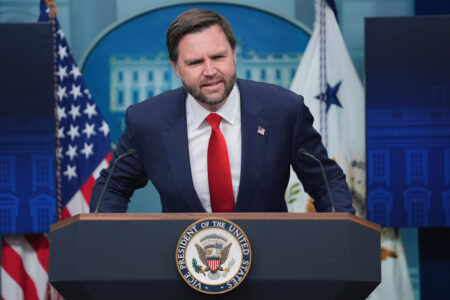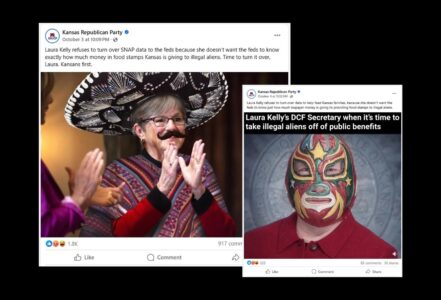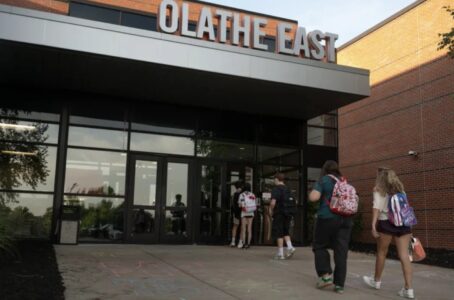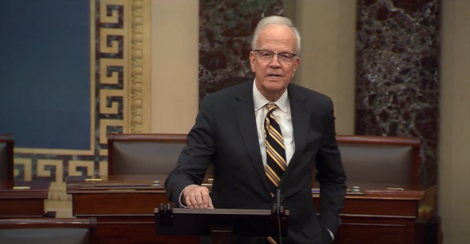Girod highlights enrollment, research growth during State of University address; faculty, staff say tensions are growing due to budget issues
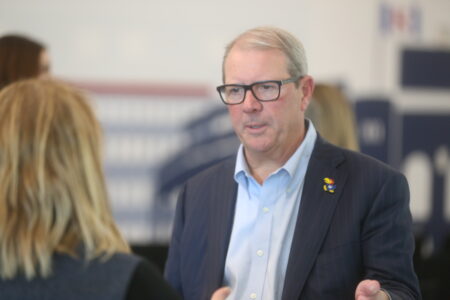
photo by: Chad Lawhorn/Journal-World
University of Kansas Chancellor Douglas Girod visits with a member of the crowd following his State of the University address on Oct. 16, 2025.
Two consecutive years of record enrollments, more freshmen than ever returning for their sophomore year, and nine straight years of increases in research funding were among the highlights at KU’s State of the University address Thursday.
“That is profound for this moment in time,” University of Kansas Chancellor Douglas Girod told a crowd of more than 200 at the Jayhawk Welcome Center.
But leaders of KU’s faculty and staff governance organizations earlier in the day had another word for it: Confusing.
Faculty and staff leaders — who were speaking to members of the Kansas Board of Regents as a part of a tour of the Lawrence campus — pointed out that KU has implemented a hiring freeze, has ordered departments to find $32 million worth of cuts on the Lawrence campus, and are doing so at a time when both the chancellor and student-athletes are getting significant increases in compensation.
“The optics are really confusing to us,” Poppy DeltaDawn, president of the University Senate told regents.
DeltaDawn said the talk of record successes in some areas but large budget reductions in other areas were creating both stress and morale problems with faculty and staff.
“We are hearing mixed messaging,” DeltaDawn said. “This is the highest enrollment in KU history, and that’s really wonderful. But why aren’t we seeing the benefits?”
Misty Heggeness, president of KU’s Faculty Senate, also told regents that there was a growing tension among faculty and staff about spending in the athletic department. The department is devoting upwards of $20 million to pay student-athletes, while also reducing by about $10 million the amount it pays the general university for services like housing, tuition and room and board.
Heggeness said those issues are creating a “very hard tension on campus.” So too, she said was the June decision by the Kansas Board of Regents to give Girod a 12% raise that brought his total salary to $1 million when state and private funding are combined.
“The pay raise of the chancellor is one that people are really struggling to get over,” Heggeness said.
Regents on Thursday billed their meeting with the faculty and staff members as a listening session, and didn’t provide a direct response to the comments. But in June, regents said they were comfortable with the raises provided to all the university CEOs because they were in line with what peer leaders were receiving, and that the leadership provided to the universities was critical.
During his State of the University address, Girod did delve into the budget issues the university is facing. While enrollment is up, state funding has not kept pace with inflation. As for the compensation issues for faculty and staff, Girod said providing market rate pay to faculty and staff is among the highest priorities for the university. He said of the $32 million in budget cuts, about $16 million of the saved money will be used to start funding a pay plan to raise compensation for faculty and staff members who are below the average of their peers.
Jeff DeWitt, the university’s chief financial officer, told the Journal-World after the address that some of those compensation adjustments will begin in January.
On athletics, Girod said there is a bigger-picture component to the spending levels.
“You know, athletics, whether you love it or not, athletics is the front door of the university,” Girod said. “It is our national brand. It is what keeps our donors and our alumni engaged. It is what attracts a lot of out-of-state students.”
Girod also noted the previously reported financial cuts that have occurred within the athletics department. Those included $16 million in funding cuts, and a reduction of about 40 positions in the department, which was achieved through both attrition and layoffs.
Other items that Girod highlighted in his annual address included:
• As part of its record enrollment class, Girod said KU had the highest number of out-of-state students in the university’s history, but also had the highest number of in-state students. The gains have come as the number of high school graduates are falling, due to lower birthrates that began about 18 years ago during the Great Recession. Girod also noted that enrollment increased at the Lawrence campus, the Edwards campus in Johnson County and the Medical Center in Kansas City.
• An update on construction of the new Cancer Center at the KU Medical Center that will increase both the amount of space available for cancer research and treatment. Construction is expected to take another two years to complete. Girod also noted construction is underway on a 300,000 square foot facility in downtown Wichita that will house the Wichita branches of KU’s medical school and pharmacy school. It also will be shared with health programs run by Wichita State.
• While research funding will increase for the ninth consecutive year when the figures are released next month, Girod said the partnerships between universities and the federal government is obviously changing immensely. Girod said research funding for this current fiscal year, which began in July, is off to a very slow start. He said researchers are continuing to submit grant applications but are hearing very little in return. Girod said he was holding out some hope that KU ultimately could benefit from federal changes. For example, he said there is some discussion in Washington, D.C. that fewer federal research dollars should be concentrated on the coasts, and more should be moved to middle America.
• Seven years into a 10-year capital fundraising campaign, KU has raised $2 billion of its $2.5 billion fundraising goal, Girod said. He said 50% of the money is pledged to the Lawrence campus, 30% is pledged to the Medical Center and 20% is pledged to the university’s athletics programs.
Several dozen members in the crowd listening to Thursday’s address were holding up small signs that said “Fair Contract Now!” That’s in reference to ongoing negotiations between the university and its new union representing faculty members. The parties are working to create a first-time contract, but it is unclear how close the parties are to reaching an agreement.
Members of the faculty and staff governance organization on Thursday told regents they had become concerned at the length of time it was taking for a contract to be put in place.
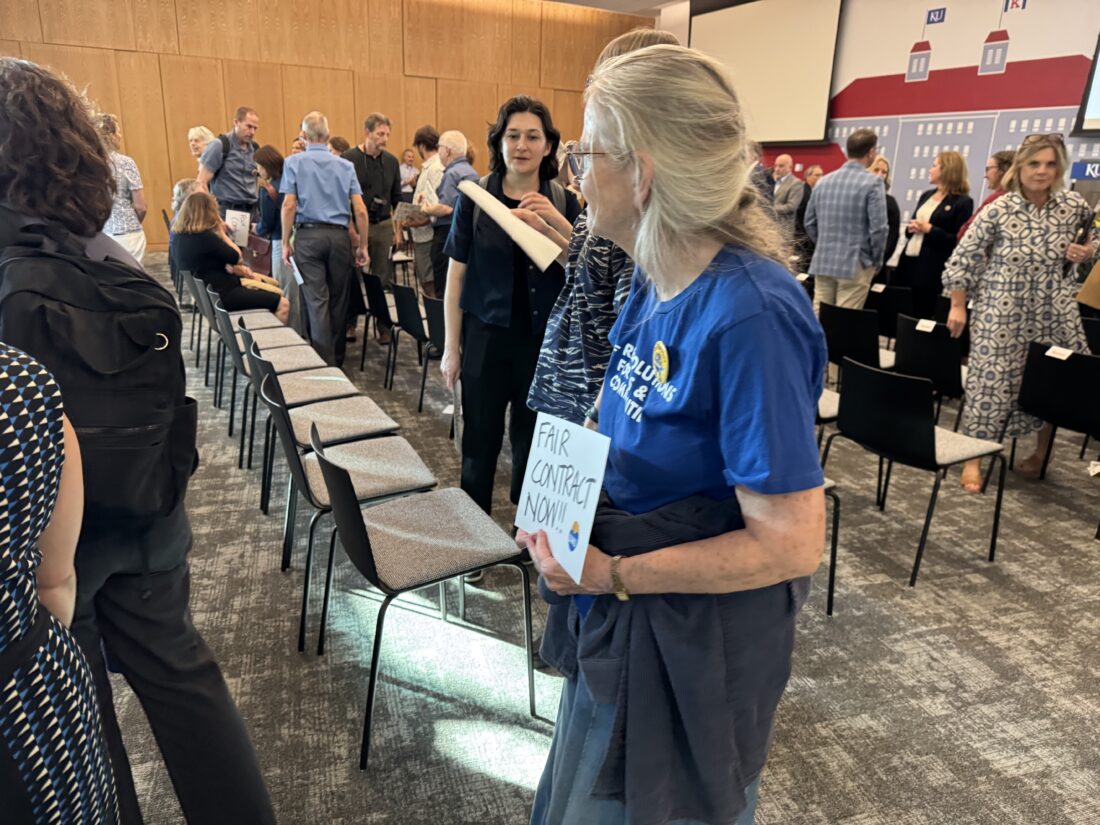
photo by: Chad Lawhorn/Journal-World
A member of the crowd at KU’s State of the University speech is pictured on Oct. 16, 2025. The sign is urging KU to reach a contract deal with its faculty union.


